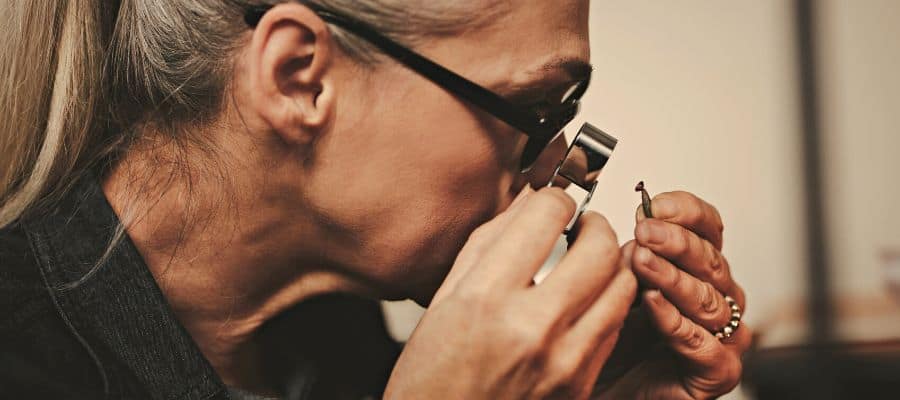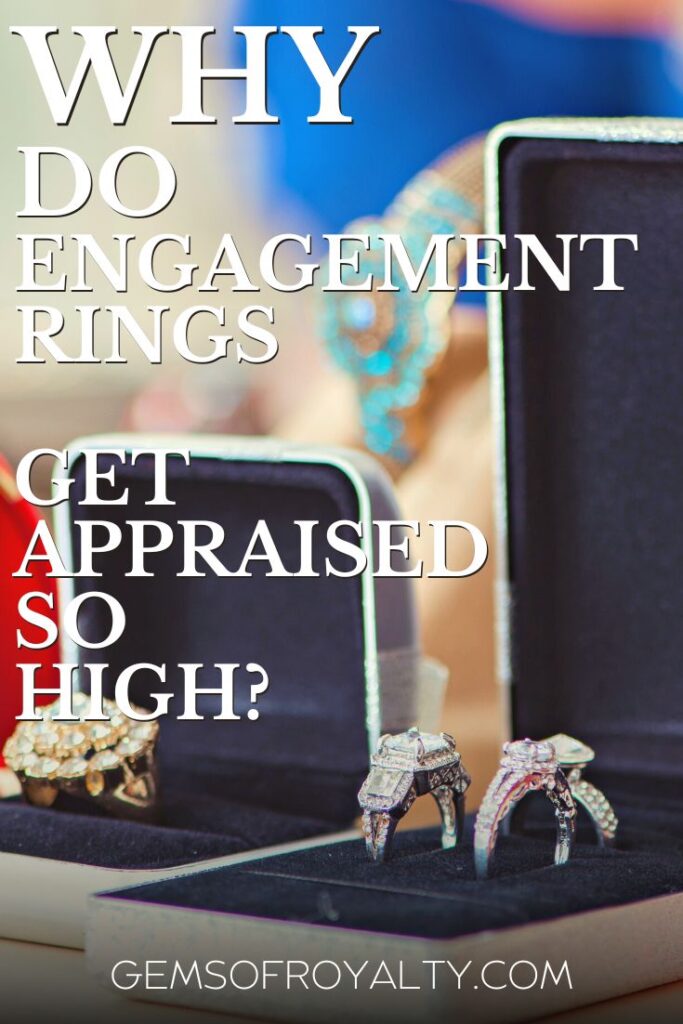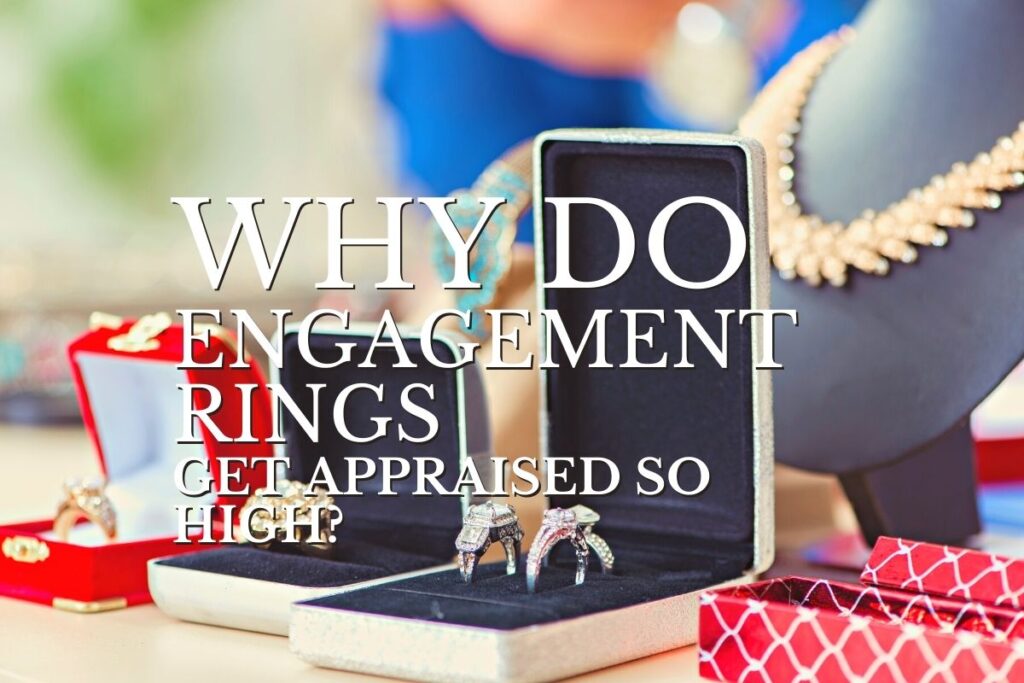How jewelry appraisals work can be confusing to many people. For example, many are baffled when they see their engagement ring appraised for much more than its purchase price.
Engagement rings get appraised so high for insurance purposes. The appraisal considers the maximum cost to replace the item with a new replica if it gets lost, stolen, or damaged. A diamond grading report may also explain your ring’s high appraisal value.
In this article, I’ll explain how diamond engagement ring appraisals work and how to read jewelry appraisal reports. You’ll also learn the different types of ring appraisals and their applications.
How Does a Ring Appraisal Work?

A ring appraisal involves examining attributes of the gemstones and metals used to build the ring and assigning them a monetary value. The result is a report that describes the item’s quality and worth.
The appraisal may be done as you wait, or you could leave your ring behind and return to collect the report later. If you have to return later for the appraisal report, you should have a way to identify your jewelry, lest you get the wrong ring back.
Most engagement rings have diamonds, which become the central focus of the appraisal. Diamond values vary by the stone’s characteristics. Diamond grading can help explain the high appraisal value of your engagement ring.
What Are the 4Cs of Diamond Grading in Jewelry Appraisal?
The appraisal of diamond jewelry follows the 4Cs formula developed by the Gemological Institute of America (GIA). The 4Cs of diamond characteristics are:
- Cut
- Color
- Clarity
- Carat weight
Let’s take a closer view of these diamond grading attributes and how they affect jewelry appraisal:
Diamond’s Cutting Style
The cut style is responsible for diamonds’ brilliance and sparkle. It’s the most important attribute in the grading system. The best cut brings out a perfect dimension and proportion balance, which enables the diamond to reflect more light to the crown.
As a result, the cut style is a major contributing factor to a diamond’s beauty and value. There’re 5 levels of diamond cut grades, ranging from Excellent to Poor. Since an excellent cut is difficult to achieve, it gets the highest value in a jewelry appraisal.
Colorless Diamond Stands Out
Diamond color grades come in 4 levels, ranging from colorless to light yellow. The color type greatly impacts diamond quality, making it a significant factor when valuing diamond rings.
The colorless diamond is the rarest, making it the most expensive variety. The yellow type is the most common, making it the least expensive.
Diamond Clarity Speaks to Purity
Diamonds can have impurities or blemishes that affect their quality. The number, size, position, and nature of the impurities are considered during diamond grading.
Clarity grading comes in six levels, ranging from “flawless” to “included.” The closer a diamond gets to purity, the more beautiful and valuable it becomes.
Diamond Price Increases With Carat Weight
When shopping for jewelry, many people look to purchase the largest diamond they can afford. The challenge is that large diamonds are rare. Consequently, the larger the diamond, the more desirable and expensive it becomes. That explains why carat weight is an important factor in appraising a diamond.
How Do You Read an Engagement Ring Appraisal?

You don’t have to be a GIA-certified gemologist or have worked at a jewelry store to make sense of a diamond ring appraisal document. A professional ring appraisal should contain the following information:
Client Name and Contact
The document will show your name and address. It may also include other contact details, such as phone number and email.
The idea is that someone reading the appraisal should tell who it belongs to, especially if the report is requested for an official application.
Appraisal Date
Prices of diamonds, gold, and other precious stones fluctuate, affecting the value of engagement rings. Therefore, the appraisal date is important to the value of your ring.
The report may also state a future date when the ring should be appraised again.
Purpose of the Appraisal
People may seek appraisals of their jewelry for various reasons. Appraisal values can be different for the same item depending on the purpose. Therefore, the document should state the purpose of the appraisal.
Description of the Ring
The document should describe the jewelry item clearly such that someone can identify it from a group of others. For example, the description should include the ring’s setting type, constituent materials, and features of those materials.
If the ring includes diamonds, the report should tell you whether the diamond is natural or man-made. Furthermore, the report should note whether the gemstones in your ring have undergone any treatments.
A picture of the ring may be included as part of the description.
Ring’s Value
For diamond rings, the GIA grading report that shows the diamond’s 4Cs attributes forms a major basis for the appraisal valuation. The appraiser looks at those attributes and assigns them monetary values depending on the document’s purpose.
The professional also assigns value to other components and features of the ring. The values are added up, and a summary of the total is shown in the document as the ring’s estimated worth.
Sales Tax
The appraisal document may include sales tax, depending on its purpose. An appraisal for insurance may have sales tax to provide additional detail that can help formulate more accurate policy coverage.
The insurance company may decide to refund you the sales tax.
Appraiser’s Statement
The report may include notes and additional documents from the appraiser. The professional may discuss limiting conditions in the appraisal process, such as where material weights are estimated.
Moreover, the appraiser may include the names and qualifications of other professionals involved in the appraisal task.
When You Buy an Engagement Ring, Does It Come With an Appraisal?

Many jewelry retailers automatically provide a complimentary appraisal when you purchase an engagement ring. Some vendors provide appraisals on request, usually for free. You’ll need to seek an independent appraisal for your ring if your vendor doesn’t provide it at the time of purchase.
Why Do People Get Engagement Rings Appraised?
People mostly get their engagement rings appraised for insurance purposes. You should have your engagement ring appraised as soon as possible if you plan to insure it. The appraisal tells the insurance company the value and features of the ring, so it knows exactly what it may need to compensate.
Apart from insurance, people may seek diamond ring appraisals for other reasons, including:
Prove Ownership of the Jewelry
A professional ring appraisal provides a complete description of the item, noting its physical characteristics and other unique features. The document also shows the name, address, and contact information of the ring’s owner.
The details captured in a diamond ring appraisal report can help settle ownership disputes.
Therefore, some people seek ring appraisals to document their ownership of the piece so they can defeat rival claims that may arise.
Determine Value for Divorce Settlement
Although people hope their marriages will last forever, sometimes the union collapses. When couples break up, they’ll go through a divorce settlement to split their marital assets.
The collapse of a marriage can spark a property fight, with divorcing couples laying claims on everything from jewelry to furniture. An appraisal may be performed on a jewelry ring to determine its value to aid a divorce settlement process.
Determine the Value of an Inherited Ring
You may want to know what the ring you inherited from a loved one is worth. While the receipt may show the purchase price, you can’t be sure how its value has changed over the years.
As a result, you may seek an appraisal to determine the ring’s current worth.
Determine Value for a Resale
If you plan to sell your ring, you may want to know its value to help you price it properly. Appraising the ring is the best way to determine its worth for resale.
You may sell your diamond ring to a local jewelry store or through a private sale arrangement. There’re also online marketplaces that connect jewelry sellers to buyers.
For Tax Purposes
The tax authority considers jewelry such as diamond engagement rings as assets. As a result, a ring may be appraised for tax purposes. For example, a ring appraisal may be necessary when establishing the value of an estate or donating the jewelry to a charity.
How Much Does an Appraisal of a Ring Cost?

Diamond ring appraisals typically cost a minimum of $50. Most appraisers charge an hourly fee ranging from $50 to $150. Others charge a flat fee per item. Whether the fee is hourly or fixed, the average cost of a ring appraisal ranges from $75 to $100.
Appraisers who charge by the hour may give you an estimate of the time they’ll take on the piece to help you estimate the cost. Those who charge a fixed fee may offer discounts if you appraise several rings.
What Are the Different Types of Jewelry Appraisals?
The different types of jewelry appraisals are retail replacement value appraisal, fair market value appraisal, and immediate liquidation value appraisal. These appraisals serve different purposes and typically yield different values for the same item.
Let’s examine what the different jewelry appraisal types entail:
Retail Replacement Value Appraisal
Also called the jewelry appraisal for insurance, retail replacement value appraisal is the most common type of ring appraisal. It shows what it would cost to replace your ring like-for-like if it got lost or stolen.
This type of appraisal aims to estimate the maximum cost of replacing the ring at a retail price. It considers that the ring would be replaced with a new one with the same attributes.
Moreover, the appraisal considers that the replacement ring may need to be custom-made or purchased at the most expensive store in town.
Therefore, retail replacement appraisal values usually come up much higher than the ring’s purchase price. The idea is that the estimated value should be reasonably sufficient to cover the replacement cost in market conditions that may be unfavorable to the buyer.
The retail replacement value appraisal is typically for the insurance company to use to calculate the premiums you need to pay. This type of appraisal requires regular reviews every few years to ensure the estimates are up-to-date.
Fair Market Value Appraisal
This ring appraisal type provides a gauge of what your ring would sell for if you put it on the market. It considers the condition of the ring as a second-hand jewelry item. It also considers that the sale happens between a willing buyer and a willing seller.
If you plan to resale or donate your ring to a charity, this is the appraisal type you seek. The fair market value appraisal also applies in estate valuation. Jewelry’s fair market value appraisal usually turns up a lower value than the retail replacement appraisal.
Immediate Liquidation Value Appraisal
This appraisal shows what your ring would sell for if you needed to sell it quickly. You may require an immediate liquidation appraisal in divorce settlements or estate liquidation.
As a result, jewelry’s immediate liquidation appraisal value is typically lower than both retail replacement and fair market value appraisals.
How Accurate Are Jewelry Appraisals?
You may get a more accurate appraisal of your diamond engagement ring if you provide the appraiser with a GIA grading report. Also called a diamond certificate, the GIA grading report details the lab analysis of your engagement ring’s diamond attributes.
With the diamond certificate, the appraiser can assign values to verified characteristics rather than guesswork. As a result, you may have a higher appraisal of your ring.
An accurate ring appraisal is particularly important for insurance purposes. If your jewelry’s retail replacement value is excessively inflated, your insurance premium costs may be unnecessarily high.
On the flip side, an undervalued retail replacement value means you won’t receive enough insurance coverage for your ring. As a result, you may incur out-of-pocket expenses to replace the jewelry if it goes missing.
How Do You Find a Ring Appraiser You Can Trust?

Besides the diamond certificate, which aids the appraisal process, the quality of the work also depends on the person you hire to do it.
Conflict of interest can be a major risk in jewelry appraisals. The jewelry store that sold you the ring may inflate its appraisal value to make you feel good about the purchase. However, that may leave you with more expensive insurance premiums than you deserve.
You may receive a significantly diminished value if you get the ring appraised at the jewelry store you want to sell it to. It profits the store to purchase the ring from you at the lowest price possible.
You can obtain an accurate appraisal of your ring from an independent professional appraiser. Here’re a few steps to finding an engagement ring appraiser you can trust:
- Go for GIA-Certified professionals: The Gemological Institute of America (GIA) is the global authority in diamond grading. GIA-certified professionals can do a great job of assessing your diamond ring’s 4Cs attributes and provide a more accurate appraisal.
- Seek experienced appraisers: If experience is the best teacher, you can bet that an experienced professional would do a better job of appraising your ring. Therefore, look for someone with at least a few years of jewelry or diamond appraisal experience.
- Look for ethical professionals: In addition to professional qualifications and experience, look for an appraiser with high ethical standards. You can only hope for a fair and accurate appraisal report if you work with someone who upholds high professional ethics. Therefore, ask the potential appraiser for references and read reviews about them.
Summary
The most common reason engagement rings get appraised so high is insurance. The idea is that the jewelry’s appraised value should be sufficient to cover the cost of replacing it with a new replica if you lose it.
Sometimes, you may receive an inflated or wrong appraisal value for your diamond ring because of conflicts of interest or unprofessional work.
Look for someone with professional qualifications, experience, and high ethical standards if you want an accurate appraisal of your jewelry.
If you found this article useful, make sure you save this pin below to your Jewelry board.


